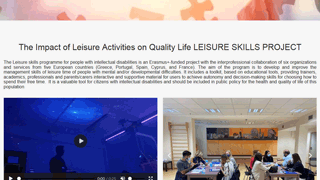
| Short descriptor of good practice |
| This program is aimed at improving the management skills of leisure time of senior citizens with mental and intellectual disabilities, as well as supporting their trainers/carers. We have prepared a toolkit of educational tools, which is an open educational resource for services, trainers, academics, professionals and parents as an interactive and supportive material to achieve this aim. Research conducted in different countries in Europe has shown that there was no suitable material and/or support for leisure skills for senior people and/or people with any kind of disabilities. As a result, their functional integration into the community is not achieved, their skills are significantly reduced as they grow older, their emotional state is negatively affected, and they need increased help and support. In addition, the existence of unstructured, unsupported and free leisure training, as well as the complete deprivation of recreational activities for people with disabilities can lead to negative behaviours towards themselves or the community. In this project, the recreational behaviour of seniors with or without disabilities has been assessed through our research questionnaire, aiming to develop skills for social interaction and interaction of these individuals. Partners have created an easily accessible, digital resource that will help seniors to break this cycle that limits their active participation in society. That cycle exists because, although general education and integration structures exist in the community, there hasn’t been, until now, an emphasis on teaching quality of life and leisure skills, which are what lead to effective integration into society and improvement of quality of life. For example, a senior person could be deprived, due to environmental factors, of performing simple activities such as shopping, going to the library, visiting friends or going to the park. Additionally, combined cognitive skills are sometimes required, for example, making a shopping list, signing up for a library card, arranging a time to visit friends, and making an informed decision about which place to visit. Project is innovative through an easy-to-use, interactive e-learning educational toolkit which offers awareness and supports experts, stakeholders, participants and their carers as well as society as a whole about the importance of teaching these skills which are easily accessible for everyone. The toolkit is shared through the project learning portal, along with other educational materials. |
| Type of setting where good practice is delivered |
| NGO / Adult education / Private company Non formal education |
| Time Frame for delivery of good practice |
| The practice is delivered in the form of online course (free) supported by research resources. Online course takes approx. 10 hours to complete. |
| Type of learner the best practice is supporting |
| Seniors and people with any kind of disadvantages. Online course is a toolkit of educational tools, which is an open educational resource for services, trainers, academics, professionals and parents as an interactive and supportive material |
| Resources used as part of good practice |
| About the project: https://leisureskillsproject.eu/about-us/ Resources: https://leisureskillsproject.eu/resources/ Online platform: https://leisureskillsproject.eu/login/ |
| Aims and objectives of good practice |
| 1. Assessing Recreational Behavior: To evaluate the leisure activities of senior individuals, both with and without disabilities, using a research questionnaire. 2. Developing Social Interaction Skills: To cultivate abilities that facilitate social engagement and interaction among senior citizens. 3. Creating Digital Resources: To develop accessible digital tools that assist seniors in becoming more actively involved in societal activities. 4. Addressing the Gap in Education and Integration: To focus on teaching quality of life and leisure skills, which are crucial for effective societal integration and enhancing the quality of life. 5. Overcoming Environmental Limitations: To help seniors overcome environmental barriers that restrict their ability to perform daily activities like shopping, visiting libraries, meeting friends, or going to parks. 6. Enhancing Cognitive Skills: To aid seniors in developing combined cognitive skills necessary for various tasks, such as making shopping lists, signing up for library cards, planning visits with friends, and making informed decisions about places to visit. |
| Evidence as to why this was considered good practice |
| Through project activities, partners made an extensive research about leisure skills policies and prepared recommendations. Large leisure skills evaluation survey was also integrated into the project activities. Both documents are available for download on the project website. |
| 3 Key learning Principles that were used in this good practice to support senior learners |
| 1. Inclusive Learning: Focusing on seniors with and without disabilities, suggesting a commitment to accessibility and accommodation in learning experiences. 2. Social Skill Development: Prioritizing the development of social interaction skills, highlighting the importance of communication and community engagement as learning outcomes. 3. Practical Application: Emphasizing the acquisition of real-world skills like making decisions, planning visits, and daily activities, indicating a focus on learning that is directly applicable to everyday life scenarios. |
| Any additional learning that we can take from this good practice example |
| / |
| Any Additional Information |
| Short video: https://leisureskillsproject.eu/wp-content/uploads/2023/05/20221114_150521.mp4 Social media: https://www.instagram.com/leisureskillsproject/ https://www.facebook.com/people/Leisure-Skills-Project/100083377750824/ |
